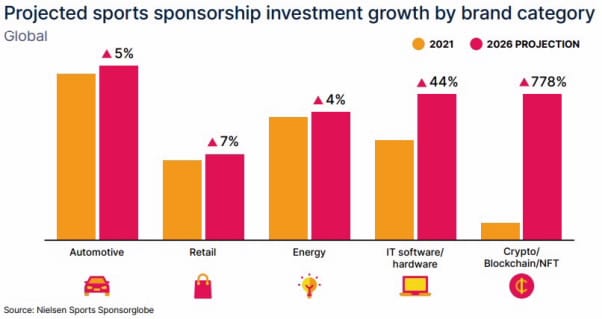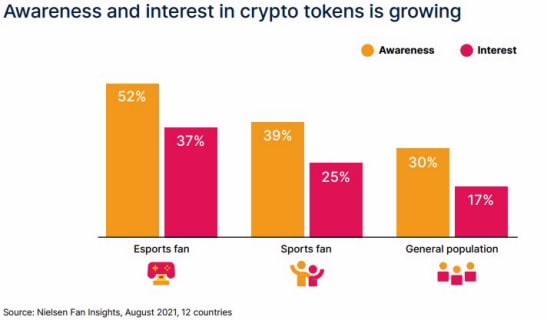Global market research firm Nielsen expects sports sponsorships through cryptocurrencies to reach $5 billion by 2026. “As a sponsorship category, crypto has quickly catapulted into the limelight, growing exponentially faster than traditional categories. Given the widespread exposure that sports provide, the opportunities for crypto-related sponsorships are blossoming, and the number of inked deals dramatically increased between 2019 and 2021,” Nielsen said in its latest sports marketing report for 2022.
Nielsen projects a 778 percent growth in sports sponsorships by 2026 from the cryptocurrency, blockchain, and non-fungible tokens (NFT) spaces. Here’s a look at the sponsorship growth expected from each segment:

Over the last year, sports sponsorships deals have seen stratospheric growth from the crypto, NFT spaces, with the percentage growth pegged at 1,100 percent, according to the report. It has already left far behind.
Fan engagement and legitimacy are key drivers
Nielsen has explicitly mentioned that “legitimacy and fan engagement” will play pivotal roles in drawing crypto sponsorships. The firm added that revenue streams cannot compromise the quality of due diligence, and hence sponsors will have to be thoroughly vetted as well.
“For brands looking to sports for sponsorship opportunities as a way to engage with new audiences, long-term success will hinge on bridging the gap between awareness and conversion. This is particularly relevant for brands in the crypto space, largely because it’s a new and unfamiliar industry that much of the general public has yet to formally enter into—even if overall awareness is rising,” Nielsen said in the report.
Corroborating the research firm’s views, over 35 football clubs across the globe have listed fan tokens on various exchanges. Owning these tokens allows fans to vote on issues concerning their favourite clubs, not limited to team uniform designs, bus designs, and match venues. The first clubs to do the same were Paris Saint-Germain (PSG) and Juventus F.C. as early as December 2020.
The need to bridge the gap between awareness and crypto conversion
Brands that intend to better engage with newer audiences through sports sponsorships will have to close the gap between awareness and conversion. Fans are also known to interact better with sponsors that address societal issues, which is similar to the trends observed by most brands across the globe.
The transition to crypto sponsorship is being led by -sports fans, followed by sports fans and then the general masses. The firm found that e-sports fans are ahead of the others in terms of crypto awareness as well as interest in cryptocurrencies. Here’s how the comparison looks:

The numbers point out that parts of the e-sports industry that had so far not been totally in favour of incorporating crypto and NFTs in the gaming space has also gradually started warming up to the idea. E-sports fans are also obviously more tech-savvy and therefore expected to be at the forefront of such changes. Nonetheless, a fan-first approach is clearly making a vast difference in terms of sponsorships. As firms continue to find innovative ways of engaging with fans, other trends will keep emerging and attracting crypto investments.

No Comments Yet